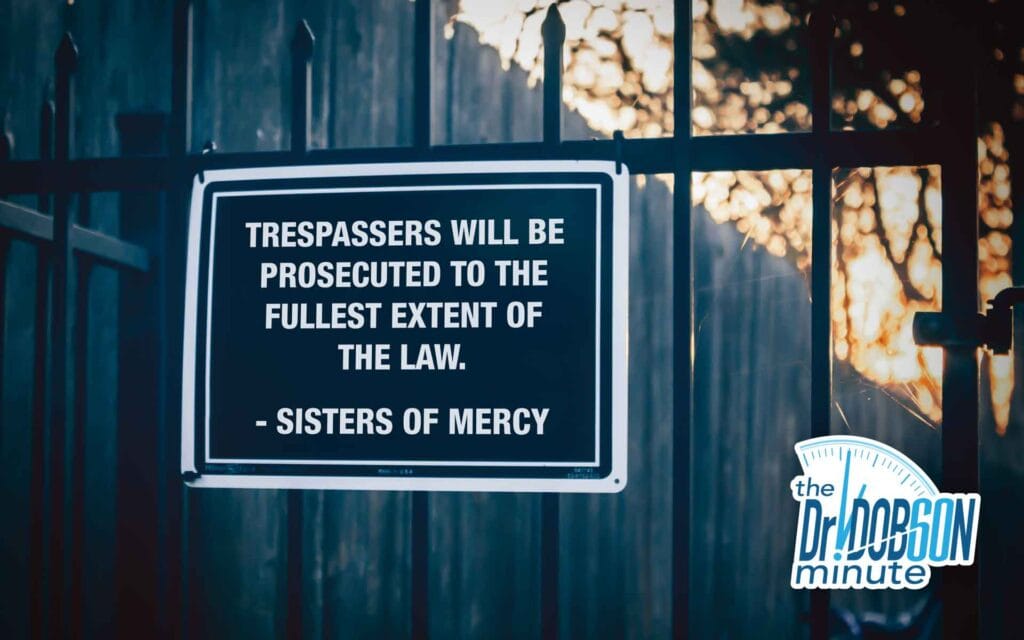There has to be a better way of communicating than shouting at one another.
Pry open the door of communication
But how can you talk to someone who won’t talk—someone whose language consists of seven phrases: I dunno. I don’t care. Leave me alone. I need money. Can I have the car? My friends think you’re unfair. And, I didn’t do it. Prying open the door of communication with an angry adolescent can require more tact and skill than any other parenting assignment. Often, mothers and fathers act like adolescents, shouting and screaming and engaging in endless battles that leave them exhausted but without strategic advantage. There has to be a better way of communicating than shouting at one another. Let me propose an alternative.
For purposes of illustration, suppose that a 14-year-old boy named Brian has entered a period of remarkable defiance. He is breaking rules right and left and seems to hate the entire family. He becomes angry when his parents discipline him, of course, but even during tranquil times he seems to resent them for merely being there. Last Friday night he arrived home an hour beyond his curfew but refused to explain where he was or why he was late. What course of action would be best for his parents to take?
Let’s assume that you are Brian’s father. I would recommend that you invite him out to breakfast on a Saturday morning, leaving the rest of the family at home. It would be best if this event occurred during a relatively tranquil time, certainly not in the midst of a hassle or intergenerational battle. Admit that you have some important matters to discuss with him that can’t be communicated adequately at home, but don’t tip your hand before Saturday morning.
Then at the appropriate moment during breakfast, convey the following messages (or an adaptation thereof):
1. Brian, I wanted to talk to you this morning because of the changes that are taking place in you and in our home. We both know that the past few weeks have not been very pleasant. You have been angry most of the time and have become disobedient and rude. And your mother and I haven’t done so well either. We’ve become irritable, and we’ve said things that we’ve regretted later. This is not what God wants of us as parents or of you as our son. There has to be a better way of solving our problems. That’s why we’re here.
2. As a place to begin, Brian, I want you to understand what is happening. You have gone into a new period of life known as adolescence. This is the final phase of childhood, and it is often a very stormy and difficult few years. Nearly everyone goes through these rough times during their early teens, and you are right on schedule. Many of the problems you face today were predictable from the day you were born, simply because growing up has never been an easy thing to do. There are even greater pressures on kids today than when we were young. I’ve said that to let you know this: We love you as much as we ever did, even though the past few months have been difficult in our home.
3. What is actually taking place, you see, is that you have had a taste of freedom. You are tired of being told what to do. Within certain limits, that is healthy evidence that you are growing up and becoming your own man. However, you want to be your own boss and make your own decisions without interference from anyone. Brian, you will get what you want in a very short time. You are 14 now, and you’ll soon be 15 and 17 and 19. You will be grown before we know it, and your mom and I will no longer have any responsibility for you. The day is coming when you will marry whomever you wish, go to whatever school you choose, and select the profession or job that suits you. Your mother and I will not seek to make those decisions for you. We will respect your adulthood. Furthermore, Brian, the closer you get to that day, the more freedom we plan to give you. You have more privileges now than you had last year, and that trend will continue. We will soon set you free, and you will be accountable only to God and yourself.
4. But, Brian, you must understand this message: You are not grown yet. During the past few weeks, you have wanted your mother and me to leave you alone—to let you stay out half the night if you choose, to fail in school, to carry no responsibility at home. And you have blown up whenever we have denied even your most extreme demands. The truth of the matter is, you have wanted us to grant you a 20-year-old’s freedom during your 14th year, although you still expect to have your shirts ironed and your meals fixed and your bills paid. You have wanted the best of both worlds with none of the responsibilities or limitations of either. It doesn’t work that way. So what are we to do? The easiest thing would be for us to let you have your way. There would be no hassles and no conflict and no more frustration. Many parents of 14-year-olds have done just that. But we must not yield to this temptation. You are not ready for complete independence, and we would be showing hatred (instead of love) for you if we surrendered at this time. We would regret our mistake for the rest of our life, and you would soon blame us too. And as you know, you have two younger sisters who are watching you very closely, who must be protected from the things you are teaching them.
5. Besides, Brian, God has given us a responsibility as parents to do what is right for you, and He is holding us accountable for the way we do that job. I want to read you an important passage from the Bible that describes a father named Eli, a priest in the temple, who did not discipline and correct his two unruly teenage sons. [Read the dramatic story from 1 Samuel 2:12-17,22-25,27-34; 3:11-14; 4:1-4 and 10-22.] It is very clear that God was angry with Eli for permitting his sons to be disrespectful and disobedient. Not only did He allow the sons to be killed in battle, but He also punished their father for not accepting his parental responsibilities.
This assignment to parents can be found throughout the Bible: Mothers and fathers are expected to train their children and discipline them when required. What I’m saying is that God will not hold us blameless if we let you behave in ways that are harmful to yourself and others. The Bible also tells parents not to overcorrect and demoralize their children. We’re going to try harder to conform to that Scripture too.
6. That brings us to the question of where we go from this moment. I want to make a pledge to you, here and now: Your mother and I intend to be more sensitive to your needs and feelings than we’ve been in the past. We’re not perfect, as you well know, and it is possible that you will feel we have been unfair at one time or another. If that occurs, you can express your views and we will listen to you. We want to keep the door of communication wide open between us. When you seek a new privilege, I’m going to ask myself this question: Is there any way I can grant this request without harming Brian or other people? If I can permit what you want in good conscience, I will do so. I will compromise and bend as far as my best judgment will let me.
7. But hear this, Brian. There will be some matters that cannot be compromised. There will be occasions when I will have to say no. And when those times come, you can expect me to stand like the Rock of Gibraltar. No amount of violence and temper tantrums and door slamming will change a thing. In fact, if you choose to fight me in those remaining areas, then I promise that you will lose big-time. Admittedly, you’re too big and grown up to spank, but I can still make you uncomfortable. And that will be my goal. Believe me, Brian, I’ll lie awake nights figuring out how to make you miserable. I have the courage and the determination to do my job during these last few years you are at home, and I intend to use all of my resources for this purpose, if necessary. So it’s up to you. We can have a peaceful time of cooperation at home, or we can spend this last part of your childhood in unpleasantness and struggle. Either way, you will arrive home when you are told, you will carry your share of responsibility in the family, and you will continue to respect your mother and me.
8. Finally, Brian, let me emphasize the message I gave you in the beginning. We love you more than you can imagine, and we’re going to remain friends during this difficult time. There is so much pain in the world today. Life involves disappointment and loss and rejection and aging and sickness and ultimately death. You haven’t felt much of that discomfort yet, but you’ll taste it soon enough. So with all that heartache outside our door, let’s not bring more of it on ourselves. We need each other. We need you, and believe it or not, you still need us occasionally. We’re going to be praying for you every day and asking the Lord to lead and guide you. I know He will answer that prayer. And that, I suppose, is what I wanted to convey to you this morning. Let’s make it better from now on. Do you have things that need to be said to me?
The content of this message should be modified to fit individual circumstances and the needs of particular adolescents. And the response from the teenager will vary tremendously from person to person. An open boy or girl may reveal deep feelings at such a moment of communication, permitting a priceless time of catharsis and ventilation. On the other hand, a stubborn, defiant, proud adolescent may sit immobile with head downward. But even if your teenager remains stoic or hostile, at least the cards have been laid on the table and parental intentions have been explained.
From Dr. Dobson’s book The New Strong-Willed Child.










